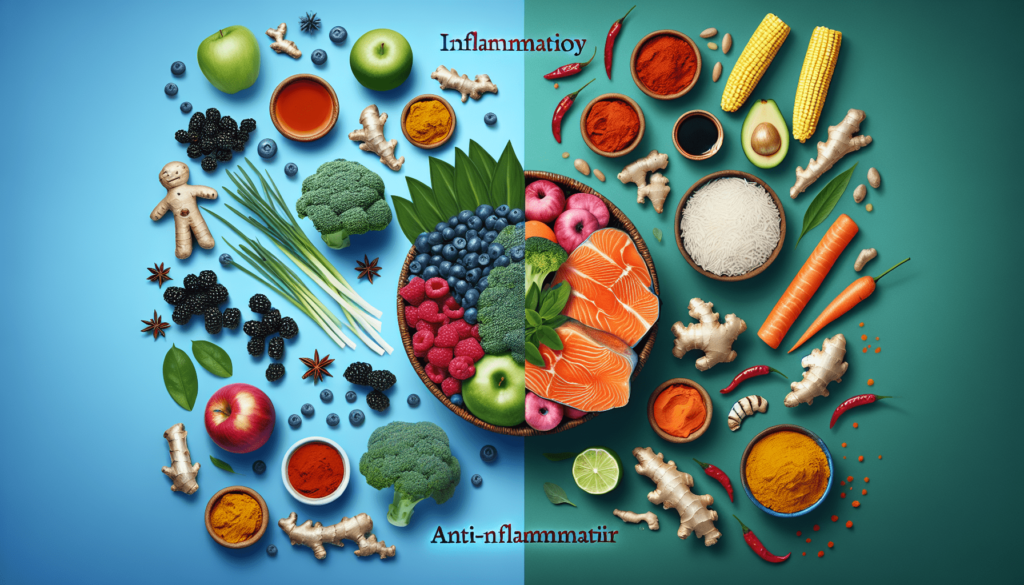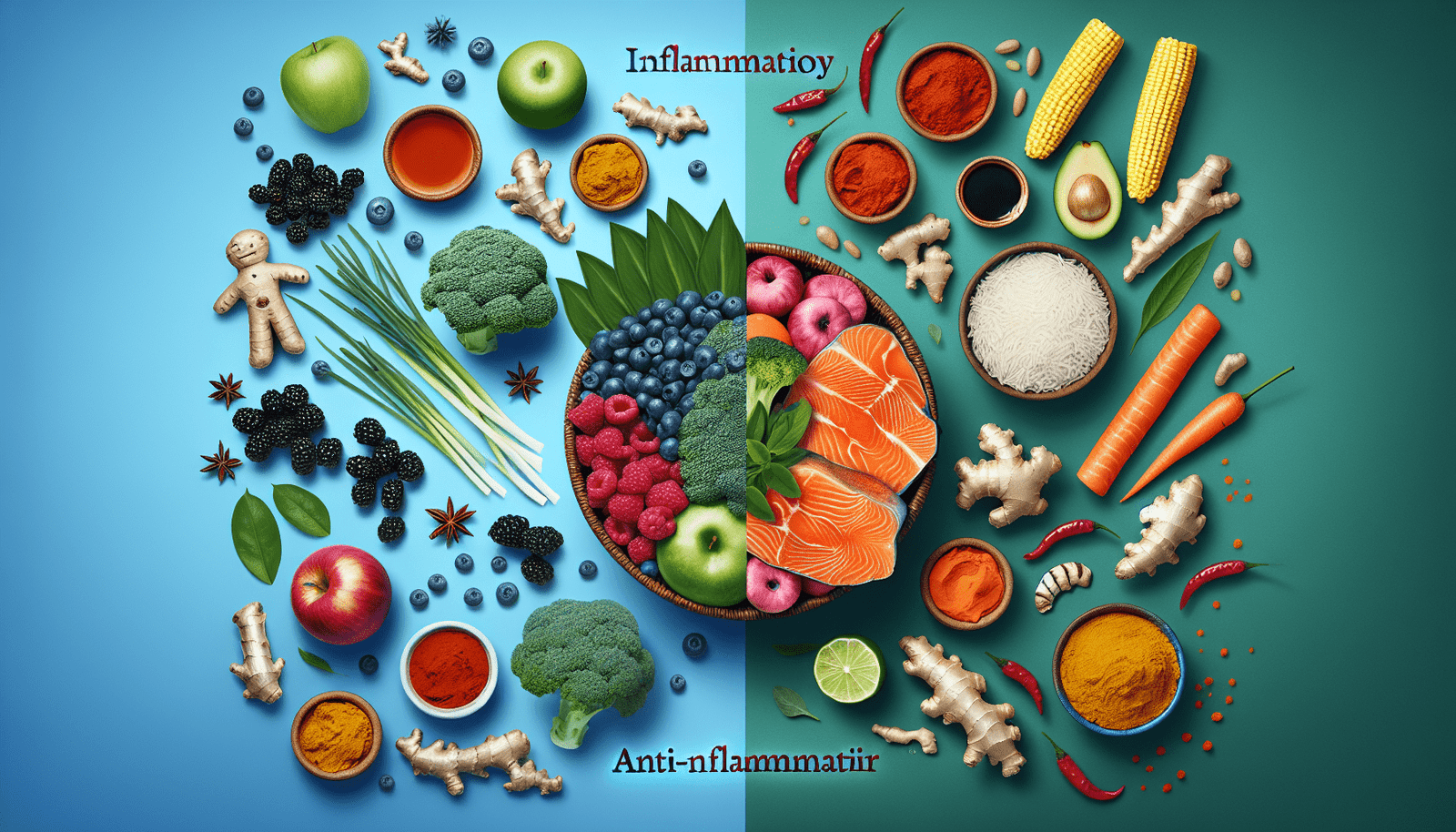Did you know that the food choices you make on a daily basis can have a direct impact on inflammation in your body? That’s right, the connection between inflammation and diet is stronger than you might think. Certain foods can actually promote inflammation, while others have the power to reduce it. In this article, we will explore the fascinating link between what you eat and inflammation, and how you can make positive changes to support your overall health and well-being. Whether you’re looking to manage chronic pain or simply want to optimize your body’s natural defense system, understanding the role of diet in inflammation is key. So, grab a seat and let’s uncover the truth about inflammation and diet together.

What is inflammation?
Inflammation is the body’s natural response to injury or illness. It is a complex biological process that involves the immune system and various cells and molecules in the body working together to protect and heal injured tissues or fight off infections. While acute inflammation is a necessary and beneficial response, chronic inflammation, on the other hand, can be damaging and is associated with a range of long-term health conditions.
Definition of inflammation
Inflammation is a protective response that occurs when the body’s immune system detects harmful stimuli, such as pathogens, damaged cells, or irritants. It is characterized by redness, swelling, heat, and pain in the affected area. The immune system sends specialized cells, such as white blood cells and chemicals, to the site of inflammation to eliminate the source of the problem and initiate the healing process.
Types of inflammation
There are two main types of inflammation: acute inflammation and chronic inflammation.
Acute inflammation
Acute inflammation is a short-term response that occurs immediately after injury or infection. It is usually characterized by symptoms such as redness, swelling, heat, and pain in the affected area. Acute inflammation is an essential part of the body’s defense mechanism, as it helps to remove harmful stimuli and initiate the healing process.
Chronic inflammation
Chronic inflammation, on the other hand, is a long-term response that can persist for weeks, months, or even years. It occurs when the immune system continuously responds to a perceived threat, even when there is no apparent injury or infection. Chronic inflammation can be caused by a variety of factors, including autoimmune disorders, chronic diseases, environmental factors, and an unhealthy lifestyle. Over time, chronic inflammation can contribute to the development of various diseases, including heart disease, diabetes, and certain types of cancer.
Causes of inflammation
Inflammation can be caused by a variety of factors. Understanding the underlying causes can help in managing and reducing inflammation.
Infection
Infections caused by bacteria, viruses, fungi, or parasites can trigger an immune response and result in inflammation. Inflammatory markers increase to fight off the invading pathogens, leading to symptoms such as sore throat, fever, and swollen lymph nodes.
Injury
Physical injury, such as a cut, burn, or sprain, can cause localized inflammation as the body responds to repair the damaged tissues. The immune system releases inflammatory mediators to initiate the healing process, leading to symptoms such as redness, swelling, and pain at the site of injury.
Autoimmune disorders
In autoimmune disorders, the immune system mistakenly attacks healthy tissues and organs, leading to chronic inflammation. Conditions such as rheumatoid arthritis, lupus, and inflammatory bowel disease are examples of autoimmune disorders that can cause persistent inflammation throughout the body.
Chronic diseases
Certain chronic diseases, such as obesity, diabetes, and cardiovascular disease, are associated with chronic low-grade inflammation. In these conditions, the immune system is activated for an extended period, releasing inflammatory markers that contribute to tissue damage and disease progression.
Environmental factors
Environmental factors, such as exposure to pollutants, toxins, and certain chemicals, can trigger an inflammatory response in the body. This chronic exposure to environmental triggers can lead to chronic inflammation and increase the risk of developing various health conditions.
Role of diet in inflammation
Diet plays a significant role in either promoting or reducing inflammation in the body. Making conscious choices about what we eat can have a profound impact on our overall health and well-being.
Inflammatory vs. anti-inflammatory foods
Some foods have been found to promote inflammation in the body, while others have anti-inflammatory properties. Inflammatory foods include processed meats, sugary beverages, refined carbohydrates, and trans fats. On the other hand, anti-inflammatory foods include fruits, vegetables, whole grains, healthy fats like omega-3 fatty acids, and spices like turmeric and ginger.
Effect of processed foods on inflammation
Processed foods, such as fast food, packaged snacks, and sugary treats, are often high in unhealthy fats, added sugars, and refined carbohydrates. Consuming these foods regularly can lead to chronic low-grade inflammation in the body. These highly processed foods can disrupt the balance of gut bacteria, increase oxidative stress, and promote the release of pro-inflammatory chemicals.
Influence of diet on gut health
The health of the gut plays a crucial role in inflammation since about 70% of the immune system is located in the gut. A diet rich in fiber, prebiotics, and probiotics can promote a healthy gut microbiome, which in turn helps to reduce inflammation. On the other hand, a diet high in processed foods and sugars can disrupt the balance of gut bacteria, leading to an overgrowth of harmful bacteria and inflammation.
Impact of sugar and refined carbohydrates on inflammation
Consuming excessive amounts of sugar and refined carbohydrates, such as white bread, pasta, and pastries, can contribute to chronic inflammation. These foods spike blood sugar levels, leading to an increase in insulin production and the release of pro-inflammatory molecules. It is important to choose whole, unprocessed foods and limit the intake of added sugars and refined carbohydrates to reduce inflammation.
Anti-inflammatory diet
An anti-inflammatory diet focuses on consuming whole, nutrient-dense foods that are known for their anti-inflammatory properties. It aims to reduce the intake of foods that promote inflammation and increase the consumption of foods that help to fight inflammation.
Foods to include in an anti-inflammatory diet
An anti-inflammatory diet should include plenty of fruits and vegetables, whole grains, lean proteins, healthy fats like olive oil and avocados, nuts and seeds, and herbs and spices. These foods provide essential nutrients, antioxidants, and phytochemicals that help to reduce inflammation and support overall health.
Role of omega-3 fatty acids in reducing inflammation
Omega-3 fatty acids, found in fatty fish like salmon and sardines, flaxseeds, chia seeds, and walnuts, have powerful anti-inflammatory properties. Including these sources of omega-3 fatty acids in the diet can help reduce inflammation and the risk of chronic diseases associated with inflammation.
Importance of antioxidants in fighting inflammation
Antioxidants are compounds found in various fruits, vegetables, and other plant-based foods that help to neutralize harmful free radicals and reduce inflammation. Foods rich in antioxidants, such as berries, green leafy vegetables, and colorful fruits, should be included in an anti-inflammatory diet.
Benefits of consuming fruits and vegetables
A diet rich in fruits and vegetables provides essential vitamins, minerals, fiber, and antioxidants, all of which contribute to reducing inflammation and supporting overall health. The wide variety of phytochemicals found in these plant-based foods have been shown to have anti-inflammatory effects and can help protect against chronic diseases.
The role of herbs and spices in reducing inflammation
Certain herbs and spices, such as turmeric, ginger, garlic, and cinnamon, have potent anti-inflammatory properties. Including these herbs and spices in your cooking can add flavor and provide additional health benefits by reducing inflammation in the body.

Pro-inflammatory foods to avoid
To reduce inflammation, it is essential to limit or avoid certain foods that are known to promote inflammation in the body.
Processed and refined foods
Processed and refined foods, including fast food, packaged snacks, and sugary treats, are frequently high in unhealthy fats, added sugars, and refined carbohydrates. These foods can increase inflammation in the body and should be limited as much as possible.
Sugary beverages
Sugary beverages, such as soda, fruit juices, and sweetened teas, are loaded with added sugars and are highly inflammatory. Regular consumption of sugary beverages can lead to weight gain, increased inflammation, and an increased risk of chronic diseases.
Trans fats and hydrogenated oils
Trans fats and hydrogenated oils, found in many processed and fried foods, increase inflammation in the body and are associated with an increased risk of heart disease, diabetes, and other chronic conditions. Avoiding foods that contain trans fats and opting for healthier fats, such as olive oil and avocado, can help reduce inflammation.
Highly processed meats
Highly processed meats, such as hot dogs, sausages, and deli meats, are often high in unhealthy fats, sodium, and preservatives. Regular consumption of these meats has been linked to increased inflammation and an increased risk of chronic diseases. Choosing lean, unprocessed meats or plant-based protein sources is a healthier option.
Excessive alcohol consumption
While moderate alcohol consumption can have some health benefits, excessive alcohol intake can lead to chronic inflammation in the body. It is important to consume alcohol in moderation or avoid it altogether to reduce the risk of inflammation-related health issues.
The impact of gut health on inflammation
The health of the gut, specifically the balance of bacteria in the gut microbiome, plays a vital role in inflammation and overall health.
The gut microbiome and inflammation
The gut microbiome refers to the trillions of bacteria and other microorganisms that reside in our digestive system. These bacteria play a crucial role in digestion, nutrient absorption, immune function, and inflammation. An imbalance in the gut microbiome, known as dysbiosis, can lead to chronic inflammation.
The link between a leaky gut and inflammation
A leaky gut, also known as increased intestinal permeability, occurs when the tight junctions in the intestinal lining become compromised, allowing harmful substances to leak into the bloodstream. This leakage triggers an immune response and can lead to chronic inflammation. Maintaining a healthy gut lining is important in preventing inflammation.
Effects of imbalanced gut flora on inflammation
Imbalanced gut flora, with an overgrowth of harmful bacteria and a decrease in beneficial bacteria, can contribute to chronic inflammation. A healthy gut microbiome, on the other hand, promotes a balanced immune response and helps to reduce inflammation throughout the body.
The role of probiotics in reducing inflammation
Probiotics are beneficial bacteria that can be taken as supplements or found in fermented foods like yogurt, sauerkraut, and kimchi. These probiotics help to balance the gut microbiome and reduce inflammation. Including probiotic-rich foods or supplements in your diet can support a healthy gut and reduce inflammation.
Specific diets for reducing inflammation
Certain diets have been shown to have anti-inflammatory properties and can help reduce inflammation in the body.
Mediterranean diet
The Mediterranean diet is a well-known eating pattern that emphasizes whole, unprocessed foods, including fruits, vegetables, legumes, whole grains, lean proteins, healthy fats, and herbs and spices. This diet has been associated with a reduced risk of chronic diseases and inflammation.
DASH diet
The DASH (Dietary Approaches to Stop Hypertension) diet focuses on consuming fruits, vegetables, whole grains, lean proteins, and low-fat dairy products while limiting sodium, added sugars, and saturated fats. The DASH diet has been shown to reduce inflammation and lower the risk of hypertension and heart disease.
Anti-inflammatory diet
The anti-inflammatory diet, as mentioned earlier, focuses on consuming whole, nutrient-dense foods that have anti-inflammatory properties while eliminating or limiting foods that promote inflammation. It emphasizes fruits, vegetables, whole grains, healthy fats, lean proteins, and herbs and spices.
Vegan and vegetarian diets
Plant-based diets, such as vegan and vegetarian diets, are naturally anti-inflammatory since they are rich in fruits, vegetables, whole grains, legumes, and plant-based proteins. These diets have been associated with reduced inflammation and a lower risk of chronic diseases.
Inflammation and chronic diseases
Inflammation plays a significant role in the development and progression of various chronic diseases.
Relationship between inflammation and heart disease
Chronic inflammation can damage blood vessels and contribute to the development of atherosclerosis, a condition characterized by the buildup of plaque in the arteries. This can lead to heart disease, heart attacks, and strokes. Reducing inflammation through dietary and lifestyle interventions can help reduce the risk of heart disease.
The connection between inflammation and diabetes
Inflammation is closely linked to the development of type 2 diabetes. Chronic low-grade inflammation impairs insulin sensitivity and can lead to insulin resistance, a precursor to diabetes. Reducing inflammation through diet and lifestyle changes can help improve insulin sensitivity and reduce the risk of diabetes.
Inflammation and autoimmune disorders
Autoimmune disorders, such as rheumatoid arthritis, lupus, and inflammatory bowel disease, are characterized by chronic inflammation caused by an overactive immune system. Reducing inflammation through diet and lifestyle changes can help to manage symptoms and reduce disease activity in these conditions.
Inflammation and cancer
Chronic inflammation has been associated with an increased risk of certain types of cancer. Inflammation can contribute to DNA damage, the formation of tumors, and the spread of cancer cells. Adopting an anti-inflammatory diet and lifestyle can help reduce the risk of cancer and improve outcomes for cancer patients.
Lifestyle changes to reduce inflammation
In addition to dietary changes, certain lifestyle modifications can help in managing and reducing inflammation in the body.
Regular exercise and physical activity
Regular exercise and physical activity have been shown to reduce inflammation in the body. Engaging in activities like brisk walking, jogging, swimming, or cycling can help reduce inflammatory markers and improve overall health.
Stress management techniques
Stress can increase inflammation in the body. Practicing stress management techniques such as meditation, deep breathing exercises, yoga, or mindfulness can help reduce stress levels and lower inflammation.
Adequate sleep and its impact on inflammation
Getting adequate sleep is essential for overall health and can help regulate the immune system. Chronic sleep deprivation or poor-quality sleep can increase inflammation in the body. Aim for 7-9 hours of quality sleep per night to reduce inflammation.
Avoidance of smoking and secondhand smoke
Smoking is a significant contributor to inflammation and can increase the risk of numerous health conditions. Quitting smoking or avoiding exposure to secondhand smoke is crucial in reducing inflammation and improving overall health.
Maintaining a healthy weight
Excess body weight, especially abdominal obesity, can promote chronic inflammation in the body. Losing weight through a combination of healthy eating and regular exercise can help reduce inflammation and improve overall health.
Conclusion
Inflammation is an intricate biological process that plays a vital role in the body’s defense and healing mechanisms. While acute inflammation is a necessary response, chronic inflammation can lead to the development and progression of various chronic diseases. Adopting an anti-inflammatory diet, including whole, unprocessed foods rich in antioxidants, omega-3 fatty acids, and phytochemicals, and making lifestyle changes, such as regular exercise, stress management, and adequate sleep, can help reduce inflammation and promote overall health. By making conscious choices about our diet and lifestyle, we can support a healthy immune system, reduce the risk of chronic diseases, and lead a vibrant and inflammation-free life.

